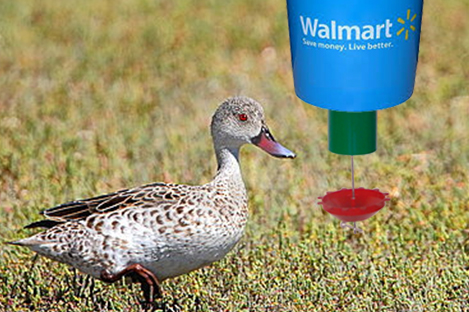
Cape Teal is a small, stocky tropical African duck. The binomial name is Anas Capensis. Cape Teal ducks is 17”–19” in length with height between 13”–18” and wingspan length between 30”–33“.They weigh around 0.7-1.1 lb when fully grown and has a life span which averages 20-30 years.
The adult Cape Teal duck has a grey head and body, finely spotted black-brown on head and neck with larger dark spots on the body. There is a thin crest on the nape. The pink bill with black tip and reddish eyes makes the Cape Teal duck attractive. The speculum is green and black bordered with white. The female is slightly smaller, paler in color and less speckled than the male. The juvenile is duller having more uniform plumage with bill paler than in adults. Although Cape Teal ducks are silent, it becomes more vocal during the breeding season. The male duck has a sharp, nasal voice and sometimes gives a high-pitched, clear whistle “swii-tsiiu” while the female duck gives a loud and nasal “querck”. Cape Teals are one of the few species of dabbling ducks that actually dive. They are capable of swimming underwater with their wings closed like other true diving ducks. It flies slowly, but it is agile and rapid when it has got started.
Cape Teal ducks have tooth like serrations around their bill suggesting filter feeding. The Cape Teal feeds on invertebrates such as insects and their larvae, tadpoles, leaves and stems of aquatic plants and seeds. For feeding seeds to Cape Teal ducks PECk-O-MATIC Automatic Duck Feeder can be effective. The PECk-O-MATIC Automatic Duck Feeder helps in overcoming the wastage of feed that can happen with traditional feeding methods.
Cape Teal ducks frequents shallow lagoons with saline or brackish waters and can be found seasonally in wetlands, reservoirs, marshes, rivers and coasts. The breeding season varies according to the range and the rainfalls. Cape Teals are known to perform what is referred to as 'nod swimming' during courtship which is a rapid scoot over the water surface in a semi-circle with the wings positioned so that the speculum is showing. However, at no time does the duck ever actually nod during such a dance. Females prefer to locate nests on islands, usually not far from water. The nest is a deep depression in the ground with a thick lining of down, well concealed among vegetation. The female Cape Teal duck lays 6-11 fairly rounded, pale or orange eggs which she incubates during 26-30 days and hatching is synchronized. The chicks fledge about 8 weeks after hatching. Both parents share the nesting duties and strongly defend the chicks against predators.